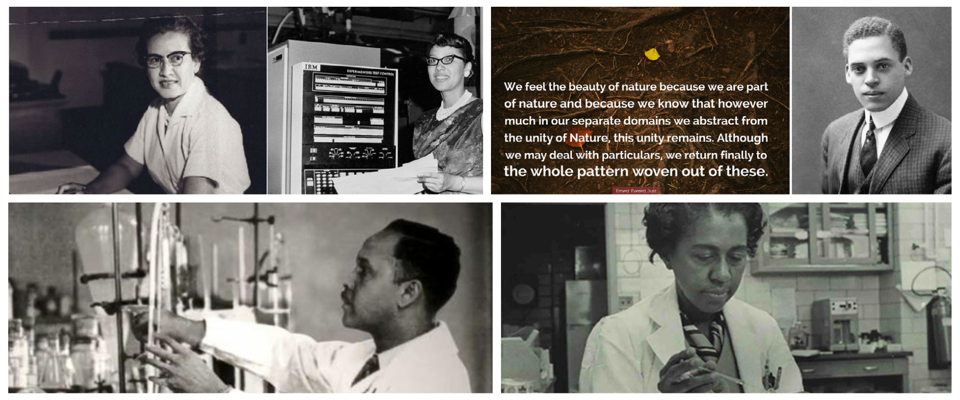You are here

Pioneers in Science and Mathematics — Celebrating Black History Month
To celebrate Black History Month this February, enjoy four profiles of notable African American scientists and mathematicians who have made important contributions to science history.
(Photo above from left to right, top to bottom—Katherine Johnson, Everrett Just Percy Julian, and Marie Daly)
Katherine Johnson, one of NASA's human 'computers,' performed the complex calculations that enabled humans to successfully achieve space flight. Johnson was honored with the Presidential Medal of Freedom in 2015 and saw her story brought to light through a book and the film 'Hidden Figures.'
Everett Just, an accomplished African American biologist and educator, Ernest Everett Just pioneered many areas on the physiology of development, including fertilization, experimental parthenogenesis, hydration, cell division, dehydration in living cells and ultraviolet carcinogenic radiation effects on cells. He advocated for the study of whole cells under normal conditions, rather than simply breaking them apart in a laboratory setting. His legacy carries on to inspire notable scientists today.
Percy Julian was a pioneering chemist who was not allowed to attend high school but went on to earn his Ph.D. from the University of Vienna in Austria. He was the first African-American chemist inducted into the National Academy of Sciences, and the second African-American scientist inducted from any field. His research at academic and corporate institutions led to the chemical synthesis of drugs to treat glaucoma and arthritis. He was the first to synthesize the natural product physostigmine, plus a pioneer in the industrial large-scale chemical synthesis of the human hormones progesterone and testosterone from plant sterols such as stigmasterol and sitosterol. Although his race presented challenges at every turn, he is regarded as one of the most influential chemists in American history.
Marie M. Daly completed her Ph.D. at Columbia University in 1947, she became the first African American woman to obtain a Ph.D. in chemistry in the United States. Daly's groundbreaking research at the Albert Einstein College of Medicine on the cardiovascular system and diet helped clarify the relationship between high cholesterol and clogged arteries. In addition to her research work at Einstein, Daly also taught biochemistry courses. Recognizing the importance of her own career path, Daly championed efforts to encourage students of color to enroll in medical schools and graduate science programs. In 1988, she started a scholarship, in honor of her father, for minority students to study science at Queens College.
At Burke Neurological Institute, we know that Diversity & Inclusion helps us to better serve our mission—the science hope demands—and makes us a stronger Institute. We honor diverse minds and beliefs held by all cultures around the world. We are committed to carry on with our mission to bring hope to those living with neurological disabilities.
